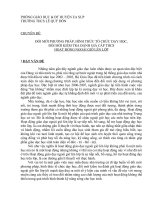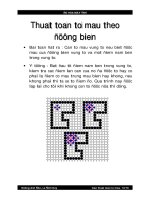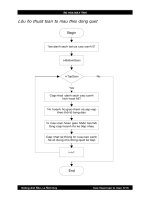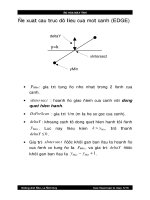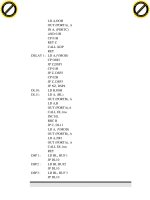Families who do not send their children to state- run schools should not be reqiured to pau educationa tã
Bạn đang xem bản rút gọn của tài liệu. Xem và tải ngay bản đầy đủ của tài liệu tại đây (81.16 KB, 2 trang )
GIAOVIEN BIEN SOAN: NGUYEN THI NGOCKINH
Writing:
Families who do not send their children to government- financed schools should
not be required to pay taxes to support universal education.
Government- financed schools are coercive political monopolies
that are funded through compulsory taxation and that have a captive
audience of pupils through mandatory attendance laws. People must pay
for the school system even if they do not send their children to state- run
schools or are not satisfied with them. The state uses its coercive taxing
power to take money from some, even individuals who do not have
children, to fund the education of others. Students can attend any public
schools without any tuition.
Since many aspirational parents want to give their kids a ‘leg up”,
the private-run schools are catching on due to their “better discipline”
and “ better education”. Parents were also more satisfied with the
‘control of violence, drugs and alcohol’ at private than government
schools. To send their kids to private schools which are rather expensive
and competitive, parents have to pay tuition, money for school facilities
and many other things, that is a financial burden to many families
especially the poor ones who cannot afford to pay private tuition after
bearing their school tax burden. So, to my opinion, in the absence of a
tax-supported system, parents will benefit by keeping their own money.
The money belongs to the parents, not the government. They would then
be free to choose their own children's schools.
In addition, if the poor are excused from the numerous education
taxes that currently exist, private education are more affordable and
widely available to them, this means that poor families would be more
able to afford the cost of financing their children's educations, then they
would have the funds to pay for private education. It is also likely that
private scholarships and charitable assistance will be available for lower
income families, especially when the person or organization funding the
scholarship knows that he is paying for a superior educational product.
For the sake of country development, parents shouldn’t be denied the right
to choose the type of education they want for their children. Children do
not learn in the same way, at the same rate, by the same methods, or
under the same conditions. Parents are in the best position to take into
GIAOVIEN BIEN SOAN: NGUYEN THI NGOCKINH
account the relevant differences in their individual children and should be
permitted to select the appropriate education for each of them. It is
critical that parents purchase education directly, when, and only for as
long as, they believe their children require it. Of course, it is likely that
the pursuit of happiness will supply enough incentive for people to want
their children to improve educationally.
By and large, education is an economic commodity to be purchased
in the marketplace according to the preferences and valuations of
education consumers. In a free education market parents and students
would decide based on the perceived costs and benefits of each
option. Only the total separation of state and school can re-institute
parental responsibility, protect parents' rights, and allow students,
schools, and teachers to flourish in a free educational environment.
Parents have moral authority over, and responsibility for, their own
children. (508words).

